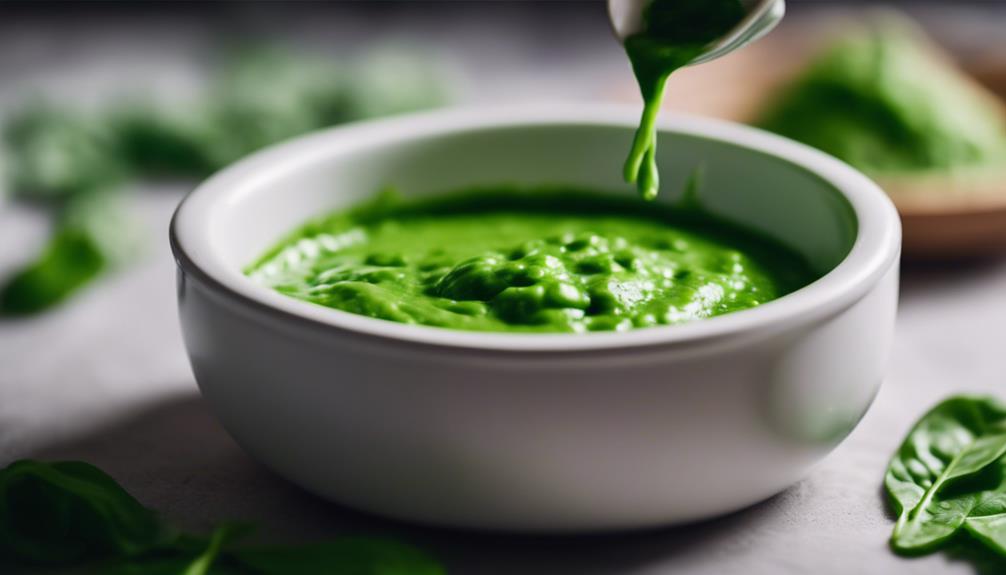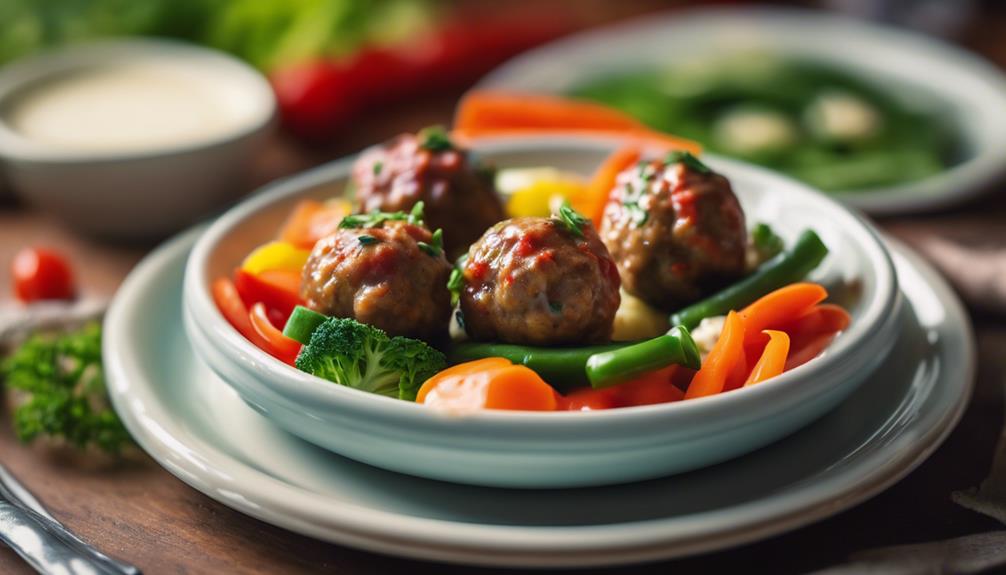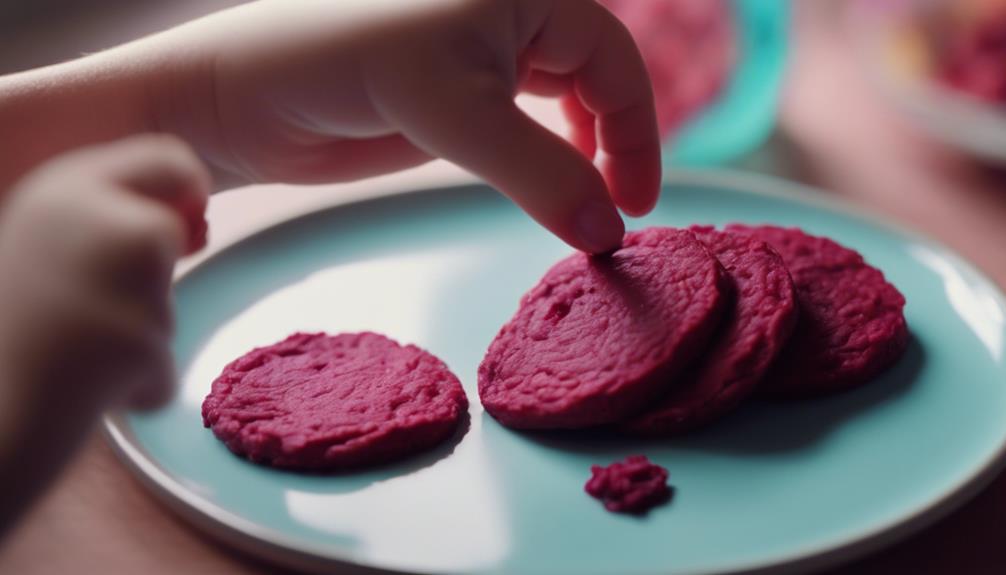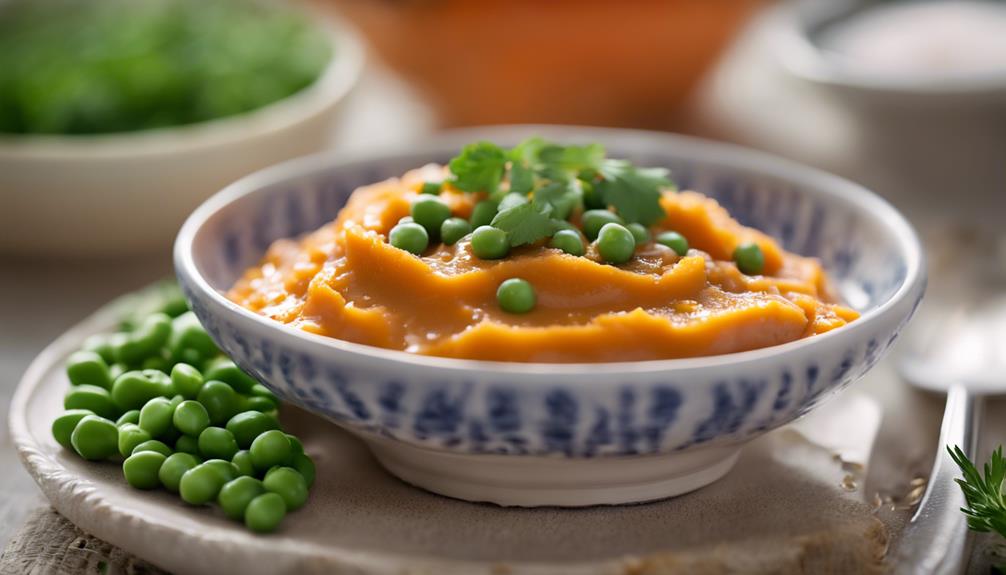Boost your baby's nutrition by introducing nutrient-rich spinach puree. Packed with vitamins A, C, and K, iron, folate, and potassium, spinach promotes healthy growth. At around 6 months, when choking risks decrease, start feeding fresh spinach to your little one. Maximizing nutrition with minimal prep, spinach puree is easily digestible for infants. Vary their diet by incorporating spinach into different meals. From preventing anemia to fostering well-being, this superfood benefits your baby's overall health. Uncover more tips and insights to enhance your baby's nutrition with spinach puree.
Key Takeaways
- Spinach puree provides essential vitamins and minerals for baby's growth.
- Introducing spinach early promotes healthy eating habits.
- Spinach puree is easy to digest and ideal for baby's nutrition.
- Boost iron intake with spinach puree to prevent anemia.
- Incorporate spinach puree into various baby dishes for added nutrients.
Nutritional Benefits of Spinach Puree
Discover the nutritional powerhouse that spinach puree offers for your baby's well-being. Spinach is a superfood packed with essential vitamins and minerals, making it an ideal choice for your little one's diet.
Creating a spinach puree is simple – just steam fresh spinach leaves until tender, then blend them into a smooth consistency. This puree recipe isn't only easy to prepare but also provides numerous health benefits for your baby.
Spinach puree is rich in vitamins A, C, and K, iron, folate, and potassium, all vital for your baby's growth and development. The iron content in spinach helps prevent anemia, while the vitamin C enhances iron absorption.
Introducing spinach puree to your baby around 6 months of age can notably boost their strength and overall health. This nutrient-dense puree is also gentle on the stomach, making it easy for your baby to digest and absorb the essential nutrients it offers.
Incorporating spinach puree into your baby's diet is a wise choice for promoting their well-being.
Serving Spinach to Babies
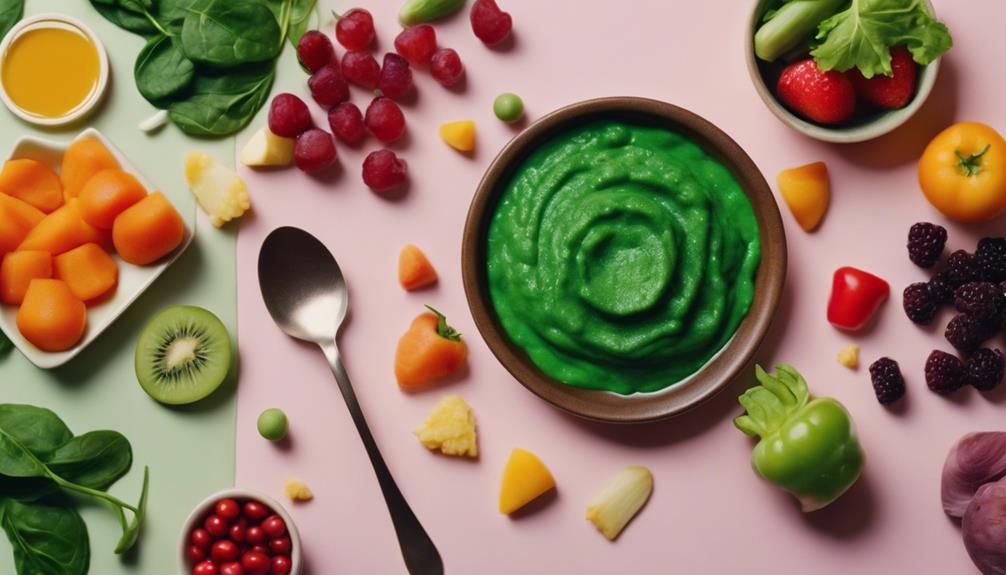
When serving spinach to babies, remember to introduce it around 6 months as a solid food option. Make sure the spinach is finely chopped to prevent choking hazards and start with small portions to monitor any allergic reactions.
Fresh spinach is best for maximum nutrition, and it can be spoon-fed or self-fed with minimal preparation.
Nutritional Benefits Overview
Serving spinach to babies introduces a powerhouse of essential nutrients pivotal for their growth and development. Here's why spinach is a superfood for your little one:
- Rich in Essential Nutrients: Spinach is packed with vitamins A, C, and K, along with iron, folate, and potassium, all essential for your baby's overall health.
- Iron Absorption: Introducing spinach around 6 months can help prevent anemia in babies due to its iron content. The presence of vitamin C in spinach also aids in better iron absorption.
- Versatile Ingredient: Spinach can be easily incorporated into various baby food dishes like purees, rice, and pasta, allowing you to boost the nutritional value of your baby's meals.
- Texture Exploration: Whether spoon-fed or self-fed during the finger food stage, serving spinach to babies provides a range of textures and flavors, promoting healthy eating habits from an early age.
Age-Appropriate Serving Suggestions
To introduce spinach to babies, consider finely chopping the leaves to reduce choking hazards while providing essential nutrients for their growth and development. Spinach puree is a great way to introduce this superfood to babies around 6 months old. As they grow, spinach can be incorporated into finger foods for baby-led weaning at 9+ months. Here's a convenient table outlining age-appropriate serving suggestions for spinach:
| Age Group | Serving Suggestions | Preparation Tips |
|---|---|---|
| 6-9 months | Spinach Puree | Steam and blend spinach |
| 9-12 months | Spinach Finger Foods | Cook and chop spinach |
| 12+ months | Spinach in Baby-Led Weaning | Serve cooked spinach pieces |
Preparation and Storage Tips
Prepare spinach for your baby by finely chopping the leaves to guarantee safe consumption and maximize nutrient absorption.
When serving spinach to your little one, keep in mind these essential tips:
- Inspect Freshness: Check that the spinach leaves have a slightly sweet aroma and vibrant green color to provide peak nutrition for your baby.
- Avoid Choking Hazards: Chop the spinach finely before serving to prevent any potential choking risks, especially for younger babies just starting solids.
- Storage Tips: Store spinach puree in the refrigerator for up to 4 days to maintain freshness, or freeze it for up to 4 months for future use.
- Versatile Ingredient: Mix spinach into various dishes like rice and pasta to introduce a variety of flavors and offer additional nutrition to your baby's diet.
Selecting and Preparing Spinach
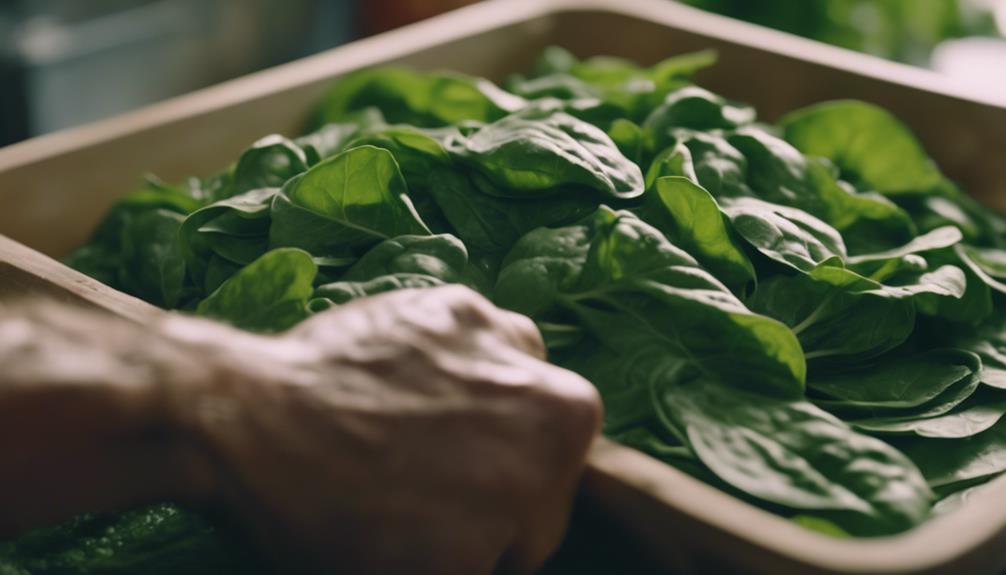
When selecting spinach, opt for bright green leaves over wilted or yellow ones for freshness.
Choose baby spinach for its tenderness and mild taste.
Remember to cook the spinach with olive oil and garlic until wilted to enhance its flavor.
Fresh Spinach Selection
When selecting fresh spinach for preparing spinach puree for your baby, opt for leaves that are bright green with a slightly sweet aroma to guarantee the best nutrition and flavor.
To make sure you choose the best spinach, keep the following tips in mind:
- Select baby spinach: Baby spinach is tender and has a milder taste, making it ideal for creating smooth purees for your little one.
- Avoid wilted leaves: Steer clear of spinach with wilted or yellow leaves as they indicate age and reduced freshness.
- Remove stems and wash thoroughly: Before blanching the spinach, ensure to remove the stems and wash the leaves thoroughly to eliminate any dirt or impurities.
- Blanch before blending: Blanching the spinach quickly in hot water before blending helps maintain its vibrant color, nutrients, and flavor in the puree.
Spinach Cooking Tips
Looking to enhance the flavor and texture of spinach for your baby's puree? When selecting spinach, opt for bright green leaves, avoiding wilted or yellow ones. Smaller leaves, like baby spinach, are ideal for their tenderness and milder taste.
Fresh spinach should emit a slightly sweet smell, indicating its quality. To prepare spinach, cook it with olive oil and garlic until wilted, enhancing its flavor. When cooking spinach for babies, finely chop it to prevent choking hazards and ensure easy consumption.
Spinach is a rich source of essential nutrients, making it a valuable addition to your baby's diet. Its benefits include being a powerhouse of vitamins and minerals, supporting healthy growth and development.
Spinach is also easy to make, requiring minimal effort to cook and prepare. By following these simple cooking tips, you can maximize the nutritional benefits of spinach in your baby's meals.
FAQS About Spinach for Babies
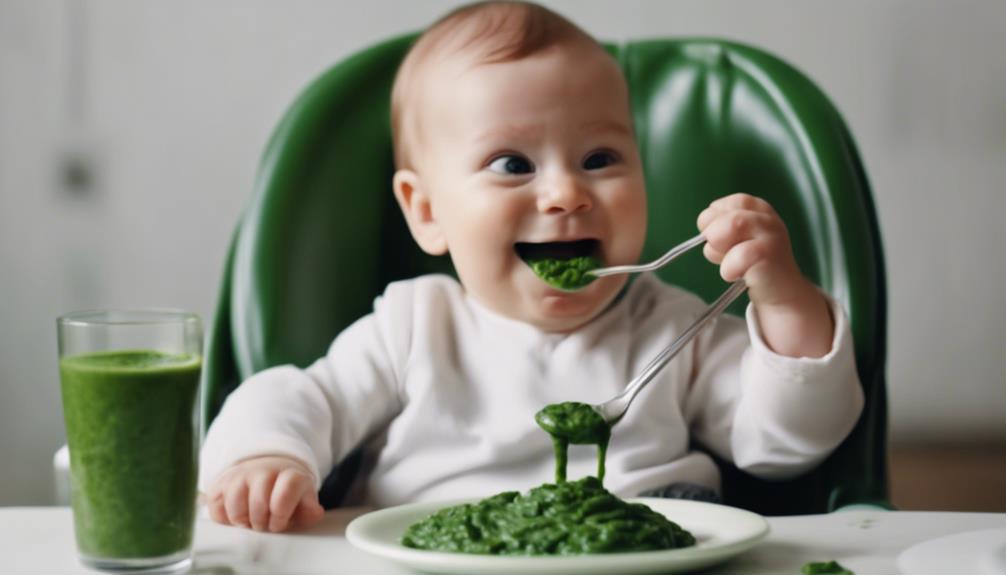
If you're curious about spinach for babies, here are some common questions answered.
- Is spinach a common allergen for babies?
Spinach isn't a common allergen, but it's advisable to start with small portions to monitor any potential allergic reactions in babies.
- How should spinach be prepared to avoid choking hazards?
It is recommended to finely chop spinach, especially for younger babies who are just starting solids, to prevent any choking hazards.
- Does spinach cause constipation in babies?
Spinach is a good source of fiber and typically doesn't cause constipation in babies, making it a favorable choice for their diet.
- What are the guidelines for introducing spinach to babies?
Follow recommended guidelines for introducing spinach to babies and watch for any signs of allergic reactions, ensuring a safe and enjoyable experience when incorporating this superfood into their meals.
Recipe and Equipment for Spinach Puree
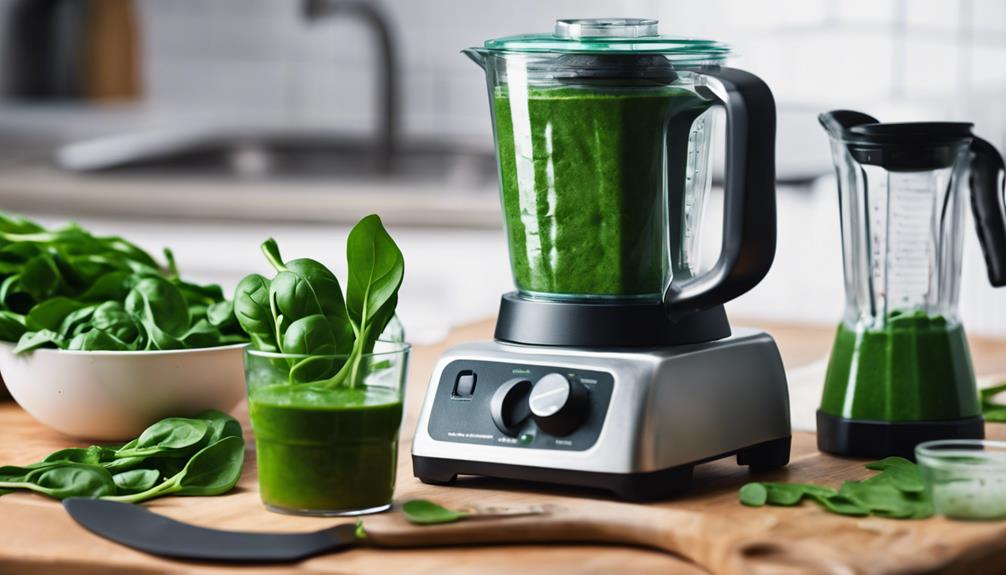
To prepare spinach puree, gather baby spinach, green beans, olive oil, and garlic as the main ingredients. These items are crucial for creating a nutritious meal for your baby. Additionally, you will need specific equipment to make the process easier. Here is a table outlining the necessary equipment for preparing spinach puree:
| Equipment | Purpose |
|---|---|
| Saucepan | Used for blanching vegetables |
| Blender | Essential for blending spinach |
| NumNum Pre-Spoon GOOtensils | Ideal for feeding babies |
| Bumkins Sleeved Bib | Protects baby's clothes |
| Tripp Trapp High Chair | Guarantees a comfortable feeding experience |
Having these tools at hand will streamline the cooking process and make it more convenient for you to prepare spinach puree for your little one. This nutritious puree can later be utilized in various ways, such as creating veggie ice pops or as a pasta sauce, adding versatility to your baby's diet.
Spinach Puree Preparation
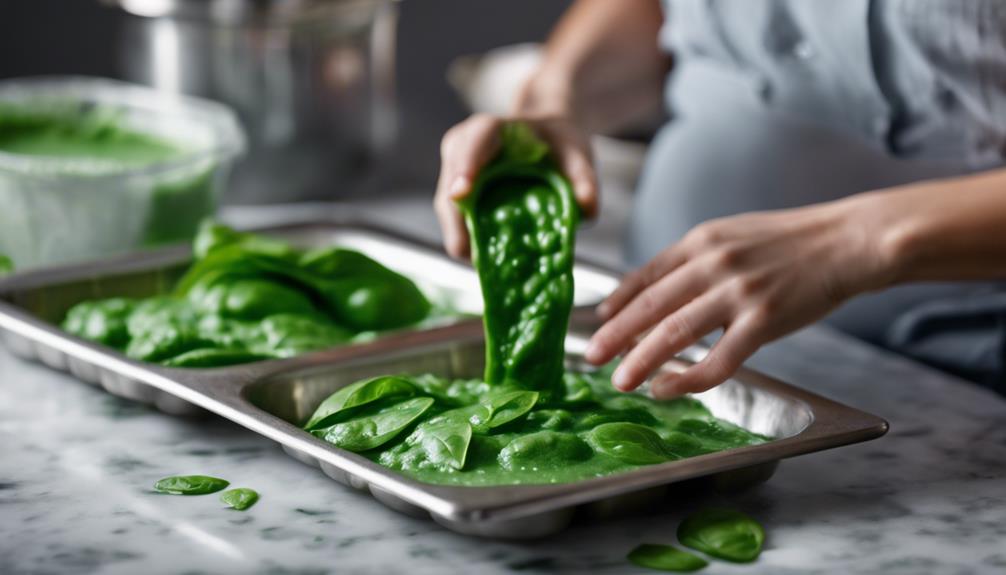
After gathering the necessary ingredients and equipment for spinach puree preparation, the next step is to make certain the green spinach is properly cleaned and blanched to retain its nutrients. Here are the steps to prepare spinach puree effectively:
- Clean the Spinach: Remove the stems and wash the spinach leaves thoroughly to eliminate any dirt or impurities.
- Blanching Process: Submerge the washed spinach in boiling water for about a minute, then transfer it to an ice bath to halt the cooking process and retain its vibrant color and nutrients.
- Blending to Perfection: Blend the blanched spinach until it reaches a smooth consistency, adjusting by adding a small amount of water or milk as needed for desired thickness.
- Storage Tips: Store the spinach puree in an airtight container in the refrigerator for up to 24 hours or freeze it for longer preservation, up to 2 months. This guarantees the freshness and quality of the puree for future use.
Frequently Asked Questions
Is Spinach Puree Good for Babies?
Absolutely, spinach puree is fantastic for babies. Packed with essential nutrients like iron and vitamins, it's a superfood that can greatly benefit your little one's growth and development. Give it a try!
What Is the Nutritional Value of Baby Spinach?
Baby spinach is packed with iron, folate, vitamins A, C, and K, essential for your baby's growth. It also provides potassium, beta carotene for vision, and boosts immunity. Incorporating it into meals can strengthen your baby's health.
Is Spinach a Superfood?
Yes, spinach is a superfood packed with essential vitamins and minerals like A, C, and K, iron, and folate. Including it in your baby's diet can boost their nutrition, supporting growth and overall health.
Is It Okay to Eat Spinach Every Day?
Yes, it's generally safe to eat spinach every day. It provides essential nutrients like iron and calcium, boosts immunity, and aids digestion. Just watch your intake if you're on blood thinners. Remember to maintain a balanced diet.
Conclusion
To wrap up, spinach puree is a nutrient-packed superfood that can enhance your baby's nutrition. With its high levels of vitamins and minerals, it's a great addition to your little one's diet.
So why delay? Begin offering this green powerhouse to your baby today and witness them flourish on the goodness of spinach. Your baby's health is worth the extra effort of preparing this simple and nutritious puree.
